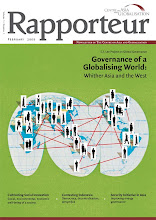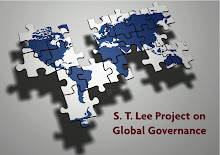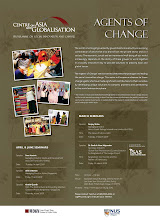Image source: The Economist
 On Sept 29, US$1.2 trillion was wiped off the value of the New York Stock Exchange as members of the House of Representatives in the US, under pressure from constituents, voted against the US$700 billon bailout package designed to resuscitate the financial system. The knockback sent reverberations around the world, with markets falling sharply from Europe to East Asia.
On Sept 29, US$1.2 trillion was wiped off the value of the New York Stock Exchange as members of the House of Representatives in the US, under pressure from constituents, voted against the US$700 billon bailout package designed to resuscitate the financial system. The knockback sent reverberations around the world, with markets falling sharply from Europe to East Asia.
What this knockback demonstrates, despite the "we are all capitalists now" proclamations of recent years, is that many Americans feel little affinity with the Wall Street set who had been "managing" their investments and who had extended their mortgages (without worrying about who would extend the cash needed to service them).
Many argue that this is a crisis of regulation, or a crisis of responsibility and ethics, as if these were technical problems to be tweaked. However, the roots of the political (as opposed to the strictly financial) crisis we are currently witnessing run much deeper. A quarter of a century of globalisation has fundamentally transformed not only our economies, but also our states and societies, leaving politicians few options.
While the current crisis has often been compared to the Great Depression of the 1930s, the two periods are distinctly different. The way out of the Great Depression essentially involved the establishing of a political compact between industrial capitalists and organised labour, with the state acting to stimulate demand and mitigate the risk to workers through a variety of compensatory mechanisms. What followed was a period of relatively equitable economic growth in the developed world that, among other things, gave birth to the mass consumer society of our time.
In contrast, the era of globalisation, which was ushered in by declining rates of profit and other crises in the 1970s and '80s, has involved a process of "financialisation", where the relationship between industrial and financial capital, which concerned political economists from Marx to Keynes, has apparently become largely redundant. Financial deregulation has permitted the enormous growth of global markets for a variety of financial products, which act somewhat autonomously from and greatly eclipse the "real" economy of trade in goods and services.
Financialisation has been part of a broader process that has placed the market at the centre of social relations, redistributing wealth and power. This has involved assaults against worker rights in many industrialised countries at a time where capital has been liberated to relocate to sources of cheaper labour.
Furthermore, at the same time many workers in the West have been both voluntarily and forcibly drawn into becoming investors - substituting the socialisation of risk that was embodied in the welfare state with tying pension plans to the market like never before.
And while the massive extension of credit, both in the form of mortgages and credit cards (which are now often tied together), provided palliative care to many, with some workers experiencing declining real wages, it also served to further lock them to a highly volatile system in which they had very little power to advance their interests vis-a-vis highly powerful and well-connected market players.
Meanwhile, the risk to capital has been socialised, with public bailouts a common feature of the past 25 years, regardless of the recent failure of the US government's rescue package. Yet, despite such bailouts, under globalisation arguments have been continuously advanced for less regulation and for the importance of paying CEOs "well".
In this hyper-capitalist environment inequality has been soaring, with the average pay packet of a high-end American CEO being 250 times that of an average wage earner. In short, there has been concentration of capital that still retains an insatiable appetite for profit.
In trying to satisfy this appetite capital has gone in search of returns in dangerous waters (such as that section of the population that aspires to owning homes yet has been so marginalised that it does not have the means to service its borrowings). In the short term, you can disguise this concentration by creating complex financial instruments to on-sell. In the medium-to-longer term, reality hits home when people begin to default.
So the big question seems to be not how to reregulate financial markets, but whether everyday citizens can be convinced that their interests are advanced by a different set of interests to theirs and an ideology that has spent the past quarter of a century eroding the "over-regulation" of the Western welfare state and dispensing with its social safeguards.
While US taxpayers were told by people like US Treasury Secretary Henry Paulson that bailing out capital was necessary to support the system for everyone and that caution had to be exercised in reregulating the financial sector, middle America doesn't appear to have much sympathy for him or the obscenely remunerated "Just Do It" set at the centre of this debacle.
The US government will still be able to put together another bailout package; however, the crisis seems far from over for the very reason that it is hard to see where new sources of real productive output will emerge, especially in an economy such as the United States.
The game of smoke and mirrors no longer holds any attraction for those left with cash to allocate.
Where the fix to the Great Depression came in the form of redistributive measures to workers within the domestic economy - a globalised world makes this process next to impossible for the very reason that capital can so easily relocate to cheaper sources of labour outside of America.
Even if capital can get back on its feet with a public bailout, finding profitable undertakings inside US borders that benefit the broad population seems highly unlikely.
Shahar Hameiri is a doctoral candidate at the Asia Research Centre, Murdoch University. Toby Carroll is a research fellow at the Centre on Asia and Globalisation, Lee Kuan Yew School of Public Policy, National University of Singapore. This article "The Politics of the Financial Crisis" was published in Bangkok Post.
RECOMMENDED READING: Emerging Lessons From The Crisis by Eswar Prasad *
"Whatever the final outcome, one thing is certain– the rest of the world will no longer be enthusiastic about adopting the free-market principles that guided US financial development. While desperate times may call for desperate measures, massive US government intervention will also make it difficult in the future to make the case that the state should stay out of the workings of the financial system."
* Eswar Prasad is professor of economics at Cornell University and a senior fellow at the Brookings Institution. He is the former head of the IMF’s Financial Studies Division.
 On Sept 29, US$1.2 trillion was wiped off the value of the New York Stock Exchange as members of the House of Representatives in the US, under pressure from constituents, voted against the US$700 billon bailout package designed to resuscitate the financial system. The knockback sent reverberations around the world, with markets falling sharply from Europe to East Asia.
On Sept 29, US$1.2 trillion was wiped off the value of the New York Stock Exchange as members of the House of Representatives in the US, under pressure from constituents, voted against the US$700 billon bailout package designed to resuscitate the financial system. The knockback sent reverberations around the world, with markets falling sharply from Europe to East Asia.What this knockback demonstrates, despite the "we are all capitalists now" proclamations of recent years, is that many Americans feel little affinity with the Wall Street set who had been "managing" their investments and who had extended their mortgages (without worrying about who would extend the cash needed to service them).
Many argue that this is a crisis of regulation, or a crisis of responsibility and ethics, as if these were technical problems to be tweaked. However, the roots of the political (as opposed to the strictly financial) crisis we are currently witnessing run much deeper. A quarter of a century of globalisation has fundamentally transformed not only our economies, but also our states and societies, leaving politicians few options.
While the current crisis has often been compared to the Great Depression of the 1930s, the two periods are distinctly different. The way out of the Great Depression essentially involved the establishing of a political compact between industrial capitalists and organised labour, with the state acting to stimulate demand and mitigate the risk to workers through a variety of compensatory mechanisms. What followed was a period of relatively equitable economic growth in the developed world that, among other things, gave birth to the mass consumer society of our time.
In contrast, the era of globalisation, which was ushered in by declining rates of profit and other crises in the 1970s and '80s, has involved a process of "financialisation", where the relationship between industrial and financial capital, which concerned political economists from Marx to Keynes, has apparently become largely redundant. Financial deregulation has permitted the enormous growth of global markets for a variety of financial products, which act somewhat autonomously from and greatly eclipse the "real" economy of trade in goods and services.
Financialisation has been part of a broader process that has placed the market at the centre of social relations, redistributing wealth and power. This has involved assaults against worker rights in many industrialised countries at a time where capital has been liberated to relocate to sources of cheaper labour.
Furthermore, at the same time many workers in the West have been both voluntarily and forcibly drawn into becoming investors - substituting the socialisation of risk that was embodied in the welfare state with tying pension plans to the market like never before.
And while the massive extension of credit, both in the form of mortgages and credit cards (which are now often tied together), provided palliative care to many, with some workers experiencing declining real wages, it also served to further lock them to a highly volatile system in which they had very little power to advance their interests vis-a-vis highly powerful and well-connected market players.
Meanwhile, the risk to capital has been socialised, with public bailouts a common feature of the past 25 years, regardless of the recent failure of the US government's rescue package. Yet, despite such bailouts, under globalisation arguments have been continuously advanced for less regulation and for the importance of paying CEOs "well".
In this hyper-capitalist environment inequality has been soaring, with the average pay packet of a high-end American CEO being 250 times that of an average wage earner. In short, there has been concentration of capital that still retains an insatiable appetite for profit.
In trying to satisfy this appetite capital has gone in search of returns in dangerous waters (such as that section of the population that aspires to owning homes yet has been so marginalised that it does not have the means to service its borrowings). In the short term, you can disguise this concentration by creating complex financial instruments to on-sell. In the medium-to-longer term, reality hits home when people begin to default.
So the big question seems to be not how to reregulate financial markets, but whether everyday citizens can be convinced that their interests are advanced by a different set of interests to theirs and an ideology that has spent the past quarter of a century eroding the "over-regulation" of the Western welfare state and dispensing with its social safeguards.
While US taxpayers were told by people like US Treasury Secretary Henry Paulson that bailing out capital was necessary to support the system for everyone and that caution had to be exercised in reregulating the financial sector, middle America doesn't appear to have much sympathy for him or the obscenely remunerated "Just Do It" set at the centre of this debacle.
The US government will still be able to put together another bailout package; however, the crisis seems far from over for the very reason that it is hard to see where new sources of real productive output will emerge, especially in an economy such as the United States.
The game of smoke and mirrors no longer holds any attraction for those left with cash to allocate.
Where the fix to the Great Depression came in the form of redistributive measures to workers within the domestic economy - a globalised world makes this process next to impossible for the very reason that capital can so easily relocate to cheaper sources of labour outside of America.
Even if capital can get back on its feet with a public bailout, finding profitable undertakings inside US borders that benefit the broad population seems highly unlikely.
Shahar Hameiri is a doctoral candidate at the Asia Research Centre, Murdoch University. Toby Carroll is a research fellow at the Centre on Asia and Globalisation, Lee Kuan Yew School of Public Policy, National University of Singapore. This article "The Politics of the Financial Crisis" was published in Bangkok Post.
RECOMMENDED READING: Emerging Lessons From The Crisis by Eswar Prasad *
"Whatever the final outcome, one thing is certain– the rest of the world will no longer be enthusiastic about adopting the free-market principles that guided US financial development. While desperate times may call for desperate measures, massive US government intervention will also make it difficult in the future to make the case that the state should stay out of the workings of the financial system."
* Eswar Prasad is professor of economics at Cornell University and a senior fellow at the Brookings Institution. He is the former head of the IMF’s Financial Studies Division.






















